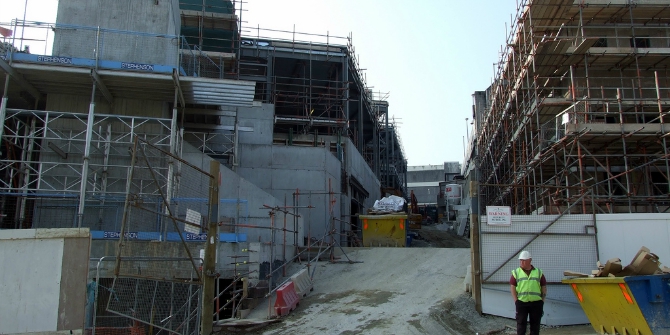 What is the future for frontline housing workers and what social value does the role have? Jo Richardson explores some of the key themes emerging in a new research project on this topic. One of the emerging themes coming out of survey responses seems to be that we may be moving from a world where housing workers need to be ‘socially minded’ and ‘customer focused’ to one where they also need to be ‘commercially minded’
What is the future for frontline housing workers and what social value does the role have? Jo Richardson explores some of the key themes emerging in a new research project on this topic. One of the emerging themes coming out of survey responses seems to be that we may be moving from a world where housing workers need to be ‘socially minded’ and ‘customer focused’ to one where they also need to be ‘commercially minded’
The housing sector is undergoing a number of significant shifts which cumulatively create a transformation in the way that housing and support services are delivered. What is the social value of frontline housing workers and how are roles adapting to contextual changes and new demands from housing customers across the UK? This is the question my research team was asked to examine by the Chartered Institute of Housing (CIH) and Wheatley Housing Group (WHG). The Housing Frontline Futures project is in its early stages and aims to report in March 2014; further information and a link to a brief survey can be found on our project web page.
So far our online questions have elicited over 300 responses and we hope this will continue to increase between now and early February when the survey will close. Housing people have been asked a range of questions, such as on key drivers for change in the sector, core competencies needed in frontline roles and important partnerships for housing both now and in the future. Perhaps unsurprisingly, the highest ranked external driver for change in the responses so far is welfare reform. This is followed by housing supply, disparity between earnings and housing costs and grant reduction. Other drivers for change were also included in ranked responses so far – including demographic changes such as an ageing population and immigration, technological changes and planning reform. As more responses come in online and through our focus groups, interviews and meetings there may be a change to the ranked change drivers, but the issue of welfare reform is one that is widely reflected in our other methods of data collection and in the debate in housing and political blogs.
Analysis of the housing sector and the profession is not new. It is generally seen as a key public service (along with social services, health, education and social security) but is afforded varying degrees of importance. Before and since Torgerson’s ‘wobbly pillar under the welfare state’ there have been observations of housing’s precarious relationship with the state and the market and, as such, there have been challenges for the housing sector and profession to define itself and for it to make an impact on policy makers. Alex Marsh discusses this in terms of impacting on policy and suggests ‘venue shopping’ in his blog; for example, taking the debate on housing to a different policy conversation. In practitioners’ responses to our survey so far, they also highlight the importance of partnerships in terms of delivering frontline housing services. In thinking about the ‘bigger picture’ response to the changing environment, there has also been work on the changing context for the housing sector, for example CIH (2010) Tomorrow’s World Today and CIH (2013) Learning Today, Leading Tomorrow.
Reflection on the meaning of professionalism is important at times of transformative change in the public sector and in housing. Lipsky suggested that ‘street level bureaucrats’ had high standards and altruistic behaviour – similar traits to Le Grand’s ‘knights’ (of course Le Grand refers to ‘knaves’ too who have more self-serving interests). Establishing the importance of what housing professionals know, and how that impacts on the communities they serve is difficult. Schön discusses this complexity and how knowledge and action can be inextricably linked; this may be particularly so in the social aspects of frontline housing workers’ roles. Reflecting on technical competence may be more straightforward for certain parts of the housing role – undertaking a repair for example. Other aspects see the knowledge and the action combined in a social value added that is difficult to define; this is a complexity that is coming out in the qualitative comments in the survey responses and interviews so far.
The place of housing both in relation to the state and the market is complex – it is an asset and a welfare good, as well as being a pivotal point of access to other services. Decent, affordable housing is also vital to health, wellbeing, educational attainment and employment prospects. A number of different skills and competencies will be needed by housing professionals such as problem solving, understanding needs of vulnerable groups, communication and customer focus. There also seems to be an emerging theme, in the survey responses to date, that we may be moving from a world where housing workers need to be ‘socially minded’ and ‘customer focused’ to one where they also need to be ‘commercially minded’. However, although some functions (such as rent maximisation) need to be ‘commercial’, many aspects of a future frontline housing worker’s role will be in dealing with social issues which could be exacerbated through welfare reform – frontline housing roles may be facing an identity crisis that needs longer-term analysis. The social aspect of delivering housing services is very important to many professionals and there is a determination amongst some to ensure that it is not lost amongst fast-paced changes as part of welfare reform and other shifts in the social housing sector.
Many people in housing and public services have already had their say on our survey but we would like to capture a wide range of views and would encourage anyone working in or with housing, with an opinion on the future of frontline housing roles, to spend ten minutes to complete the survey online.
Note: This article gives the views of the author, and not the position of the British Politics and Policy blog, nor of the London School of Economics. Please read our comments policy before posting.
About the Author
 Dr Jo Richardson is Principal Lecturer in the Centre for Comparative Housing Research at De Montfort University, Leicester. www.dmu.ac.uk/cchr @socialhousing
Dr Jo Richardson is Principal Lecturer in the Centre for Comparative Housing Research at De Montfort University, Leicester. www.dmu.ac.uk/cchr @socialhousing







